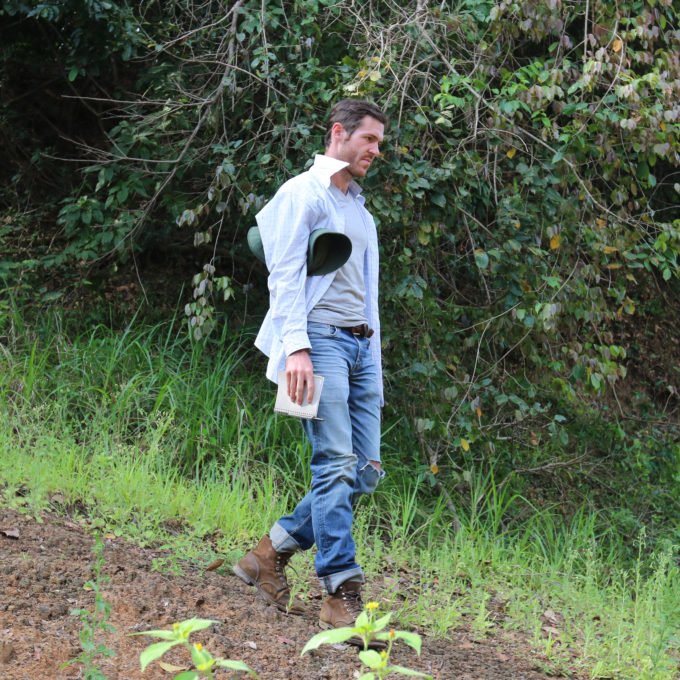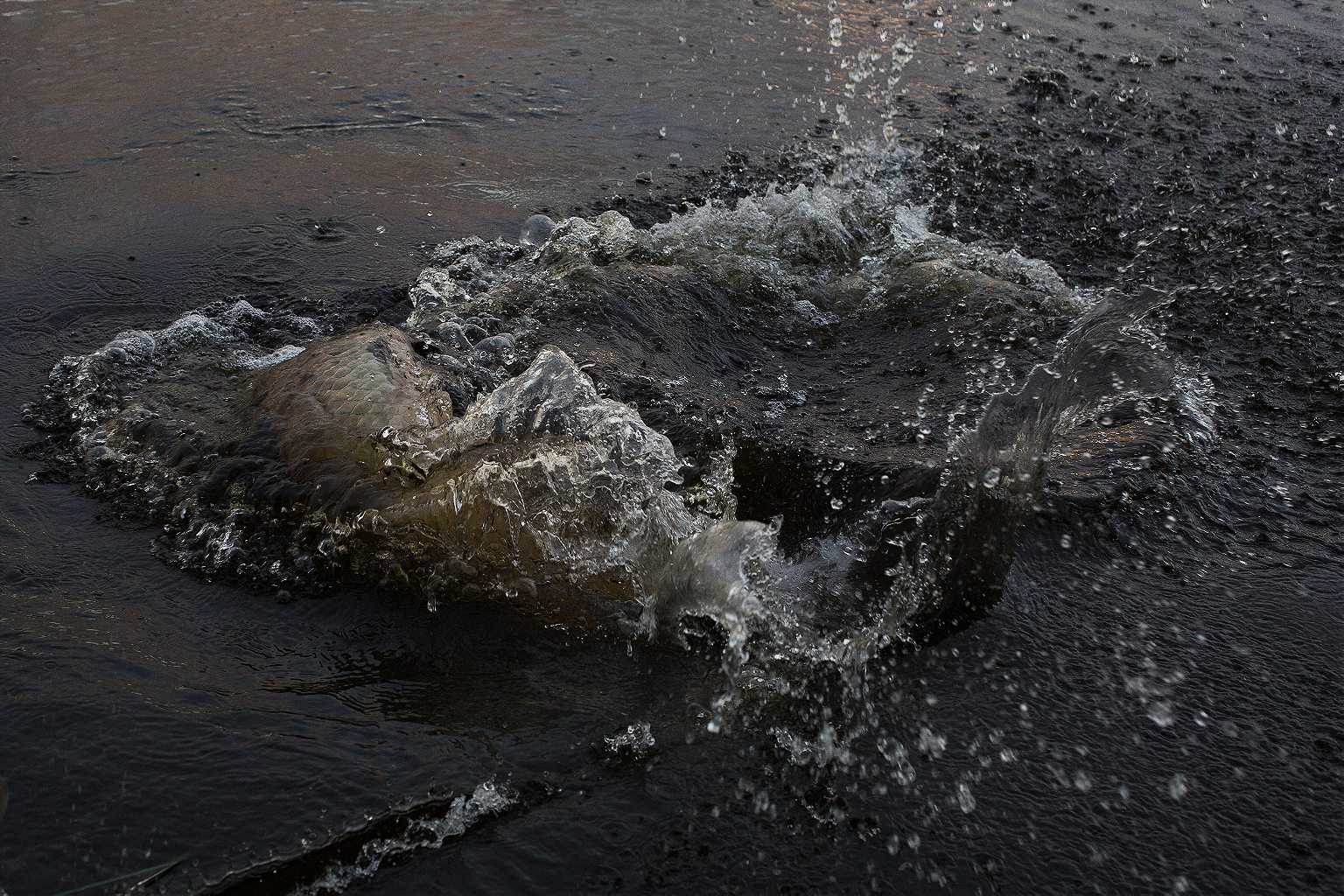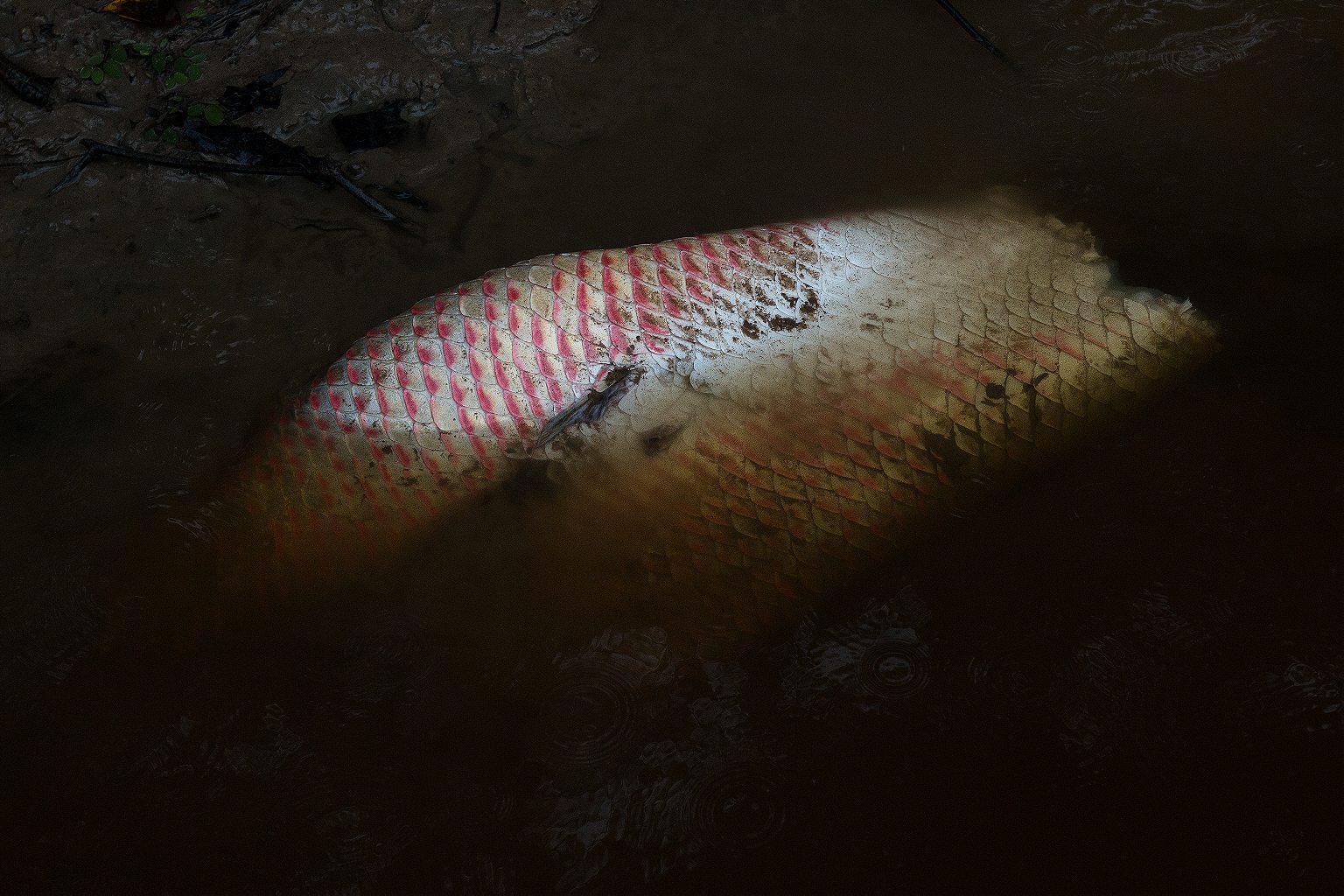
Punking the Paiche with Michael Snyder

Journalist Michael Snyder talks with Nathan Thornburgh about an invasive fish called paiche in the Bolivian Amazon.
This week on The Trip: Drinking Around the World with Exceptional People, host Nathan Thornburgh sits down with journalist Michael Snyder to discuss a hulking, invasive fish causing problems in the Bolivian Amazon. Snyder talks about how to travel to the Amazon and mimics the airbreathing paiche’s surfacing grunt. Then Thornburgh talks trash about iguanas, which are invasive in his hometown Key West, and it devolves from there.
Here is a condensed transcript of the conversation. You can listen to the full episode, for free, on Apple Podcasts, Stitcher, Spotify, or wherever you get your podcasts.
Nathan Thornburgh: So, tell me something I don’t know about the paiche.
Michael Snyder: What kind of drew me to the paiche in the first place as a story is that in its native habitat in Peru, in Brazil mostly, it’s endangered or it’s considered threatened according to an international conservation law. But in Bolivia, it’s invasive. So you have a species that is, as far as everybody is concerned, legally threatened with extinction or threatened to become threatened with extinction if it continues to be hunted in the wild. But since the 1970s, it has invaded the Bolivian Amazon. I think now it’s invaded something like a quarter of the Bolivian Amazon. So, Bolivian fishermen are in kind of a weird position legally speaking because of this giant fish.
Thornburgh: So, it’s like as if like bison started showing up around the city…
Snyder: If bison were to turn up somewhere in Vancouver right across the national border. They shouldn’t be there. I don’t know much about bison or Vancouver. I know nothing about Vancouver. But yeah, suddenly there are all these rules protecting this animal but they shouldn’t be in this space in the first place and suddenly they’re like, I don’t know, killing all the people who live in Vancouver or some native species of roving mammal is now endangered because of its presence.
Thornburgh: I feel like we’re just totally nailing this analogy. The paiche in Bolivia is definitely the bison in Vancouver.
Snyder: Absolutely. And the thing about the fish is it’s carnivorous. So, it is eating all of the native species…or so people think. That’s what fishermen will say. Unfortunately, there’s not a ton of data about the paiche. It takes a lot of time and money to gather good scientific information so they don’t have conclusive data that says that this fish is actually harming local species. But every fisherman you talk to there will confirm that they’ve seen substantial declines in native fish species since the arrival of this fish.
Thornburgh: Isn’t it possible that like there are lots of other reasons why these fish are going out and people are just saying like oh look at the paiche.
Snyder: Totally. And that part of the thing about it. There’s a hydroelectric problem. There are a lot of dams being built just across the border in Brazil, which is affecting migratory fish and keeping certain species of migratory fish from coming into that ecosystem. So, that’s one problem. Then there’s always the question of overfishing.
But, you hear crazy fucking stories about this fish. You hear people talking about it being a science experiment that the Peruvians deliberately released into their waters. You hear people say this fish is was raised by scientists and fed on the blood of livestock.
Thornburgh: It’s like the chupacabra fish.
Snyder: Kind of. But nobody believes it’s a real species.
Thornburgh: Aw shit.

Snyder: They are exporting it from Peru, you know. The Peruvians are exporting it.
Thornburgh: And we’re selling it as Chilean sea bass.
Snyder: We were selling it as a sustainable alternative to Chilean sea bass at Whole Foods.
Thornburgh: And it’s called…?
Snyder: I think they sell it as paiche. In other places, they sell it as Amazonian cod. It’s pretty similar to cod in the sense that it’s dense, and not super fatty, and doesn’t have a ton of flavor.
People in Bolivia don’t like eating it. They think it’s flavorless compared to their native fish species. They just don’t really want it. It’s getting more popular in the cities, but if you go into these fishing communities, they want nothing to do with this fish.
Paiche would be perfect for making fish sticks.
Thornburgh: Well, fucking Americans would be all over that.
Snyder: Exactly. They really need to be exporting it but they legally can’t. That’s the funny part.
Thornburgh: Got it. They cannot because it’s threatened with being threatened.
Snyder: Right. Essentially, it’s listed as a species that could be threatened if its exports and trade are not closely regulated, which basically means that wild-caught specimens cannot be exported. The Peruvians can export and the Brazilians can export because they have fish farms.
The fisheries sector is such a minuscule part of the Bolivian economy and Bolivia doesn’t really have money for fisheries. They have to find a way to consume it either internally or to trade it illegally into Brazil and Peru.
Thornburgh: Got it.
They sound like pigs when they come up to breathe.
Snyder: The whole reason the paiche ended up in Bolivia in the first place is that in the 60s and 70s, when it was beginning to be acknowledged that there was going to be this issue of overfishing in the wild, Peruvians started fish farms in the southern part of the country where the paiche wasn’t originally found. In ’79, I believe, there was a big flood and one of those fish farms was breached. All of these fish that were put there in first place in order to protect the species from overfishing in the wild were then washed into the Bolivian watershed and created this problem of invasion in Bolivia.
Part of the problem in Bolivia has been the oxbow lakes, which are formed when curves in the river are cut off by erosion. Often, in the rainy season, they’ll reconnect to the mainstream of the river. Those are historically where all these other fish species go to reproduce. Paiche like those places too, so they are now setting up there and eating all of the young of the other fish.
Thornburgh: That is a classic move like a dick move in the fish world.
Snyder: These fish are kind of assholes. They’re also really ugly.
Thornburgh: Do we have any more insults we can heap on these paiches?
Snyder: They sound like pigs when they come up to breathe.
Thornburgh: So, we’re talking about an ugly asshole fish that comes up and grunts like a pig when it breathes. Amazing.
Related Reads
Snyder: You know there’s a hidden port on the Bolivian side is right next to where the customs agents sit. Fish is sold illegally across the border with Brazil.
The Brazilians started to crack down more on illegal fish coming across because people would go across to the Bolivian side and buy the baby fish to put into fish farms on the Brazilian side. So, they would be coming across the river with buckets full of these baby fish and they would see the border police coming, mostly to see if they had this fish illegally crossing, and they would just throw them into the river. That’s part of the reason that this fish is spreading.
Thornburgh: That’s amazing.
Snyder: There are all these factors affecting the spread of paiche and a lot of them are driven by well-meaning laws that just don’t really do a great job of regulating what they’re supposed to regulate.
Thornburgh: Well, one of the things I love about the story, besides the fact that it’s an ugly asshole fish grunts like a pig, is that it’s a very touching story about all of man’s worst impulses. They’re making dams in these terrible ways, and then it floods and the paiche to get everywhere. It’s like this series of consequences and the paiche have been the beneficiary of a lot of shitty human stuff.
Snyder: I mean you’re looking at a species that’s been around for 5 million years, even if they’re kind of dumb and surface to breath. Their need to surface to breath is they part of the reason they were once hunted so close to extinction. They’re really not hard to hunt. People in Bolivia will tell you that they are, but if you talk to people who are from the areas where paiche is native, they’ll say that you just have to wait for them to surface and you shoot an arrow at their heads.
In the rainy season, a lot of the other fish tend to swim down the middle of the rivers and the paiche to swim at the edges. So, people set up nets, hang out, chew a bunch of coca, drink a bunch of beers, go back and then sometimes get a dozen fish out of one net. It’s kinda a little too easy in some ways. It leaves a lot of idle time which isn’t great.
Part of what’s disturbing for us when it comes species like this, part of the reason people are so undone by it—other than the fact that it’s weird looking—is that it’s a reminder of the impermanence of things. We like to imagine the natural world being stable and in balance. But the idea of this like static natural world that exists in perfect equilibrium that never existed. That’s a human invention. So, invasions are a reminder of the fact that everything’s always kind of collapsing around us and always has been. We’re part of the thing that collapses. The world doesn’t exist to sustain us. Other species are destroyed all the time. Other species are born all the time. Flux. That’s a hard thing for humans to wrap our heads around, I think.

Thornburgh: So, what’s your next, great water story for Roads & Kingdoms?
Snyder: An area I’m really really interested in is the Pacific coast of Mexico. I wrote a piece on the earthquake recovery last year.
Thornburgh: I remember this and I remember your descriptions of a place so in touch with its old ways of eating that in the market that was destroyed, you’d see big vats of mole with an iguana.
Snyder: With lots of iguanas.
Thornburgh: Lots of iguanas. Not just one for flavor.
Snyder: As it turns out, it’s delicious. It’s kind of like frog legs, but with fish skin. It’s really good.
Thornburgh: I’m down. I’ve tried to kill iguanas in my yard in Key West so many times. They’re really fucking hard to kill.
Snyder: Are they hard to kill?
Thornburgh: They are hard to kill. Well, I should say like I didn’t have a weapon.
Snyder: We’re going to get in a lot of trouble from the animal rights people.
Thornburgh: No, no. Come down to Key West and have an iguana shit on your porch for six months. They’re invasive like the paiche. They’re not supposed to be down there. You’re not actually allowed to kill them, but what we what we do is we just call up people in the community who are from Central America and they are just like, “great.” It’s like asking a white person if they want to come and collect the potato salad that’s in your yard. They’re like, “this is perfect. I’ll be right over.”
Snyder: It’s delicious. It’s really nice meat.
Thornburgh: In any case, I encourage everybody listening to go to Roads & Kingdoms and read Michael’s story about the paiche. This is an ugly ass hole of a fish that you will be fascinated by. Thank you, Michael.
Snyder: Thank you.
This conversation was edited and condensed. You can listen to the full episode, for free, on Apple Podcasts, Stitcher, Spotify, or wherever you get your podcasts.
Up Next
Day Drinking at Netflix
Fermenting in Oaxaca
Paulina Garcia talks with Nathan about mushroom tea, coyote skins, and how her group of Norteños ended up living in Oaxaca.
Marketing a Better Mezcal
This week on The Trip, Niki Nakazawa talks with host Nathan Thornburgh about leaving behind the art world for the food world and the future of mezcal.
Sipping Through Austria
Writer, editor, and Vienna native Alexa van Sickle—shown here in Saint Petersburg with The Trip host Nathan Thornburgh—talks about her boozy road trip through Austria
Dreams of Pickled Heron in Galway
One of Ireland’s great chefs, JP McMahon, talks swan pie, pickled heron, and other delicious cruelties of yore.






